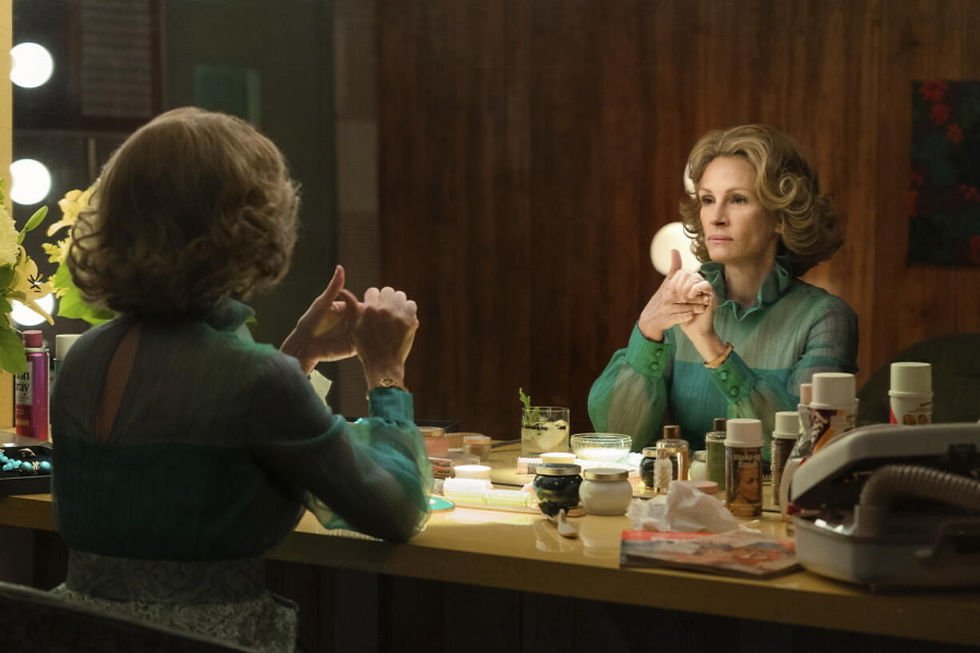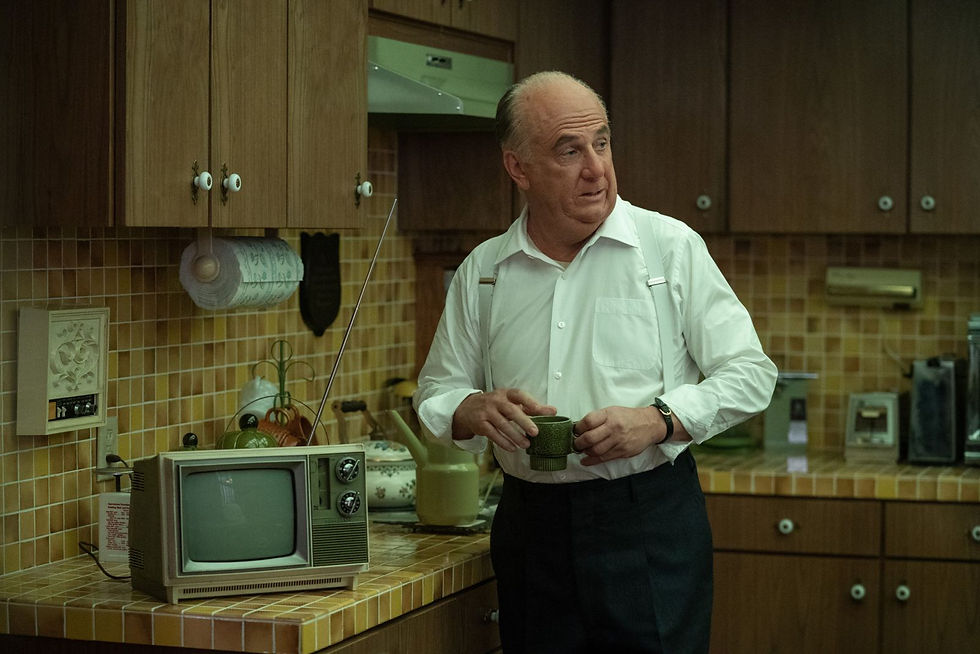Under the Glass White Shield: a review of the series "Gaslit" starring Julia Roberts and Sean Penn
Starz Channel's timely detective drama about a little-known side of the Watergate scandal.
Summer 1972. President Richard Nixon is ordered to install wiretaps in the office of the Democratic Party of the United States, after which the burglars are apprehended by the police. The series explores the unexpected role in the process of Martha Mitchell (Roberts), wife of President John Mitchell's closest associate (Penn). Martha went against the official policies of the Republican Party and was not afraid to openly criticize the actions of the head of the United States, which gradually led to Nixon's resignation.
"Watergate was wrong. Martha was right," reads the slogan of Gazlit. The title combines references to classic Hollywood ("Gaslight" with Ingrid Bergman) and the current term "gaslighting" (psychological abuse of a person and forcing him to doubt his own adequacy), derived from the film. The perky and eloquent southerner Martha Mitchell, nicknamed the mouth of the South, is known today only to those who studied it in detail or personally witnessed it in the 1970s. The most notorious impeachment in modern history, not only in the United States but also in the world, still belongs to Nixon, and Martha, who found herself in the simultaneously advantageous and extremely dangerous position of wife of a high-ranking official, is not the least to be thanked for it.
One of the executive producers of Gazlit was Sam Esmail, the author of Mr. Robot and the corporate thriller Homecoming, starring Roberts. The new collaboration with the actress is more traditional in terms of narrative, going to a thoroughly researched historical period. However, Esmail, along with showrunner-debutant Robbie Pickering, always manages to crack open extra secret "doors," setting up microphones in flowers and other secluded corners of the White House to dissect the chaos from within in detail, resorting to the relatively inexpensive services of artistic exaggeration.

"Gazlit often tries to be ironic, like the work of Armando Iannucci ("The Death of Stalin," "The Vice President"), but in the end accepts minimal borrowing. To the rhetorical question of the FBI investigator ("what if they're just all idiots there?"), the nod here is affirmative: of course they're idiots, but also wildly dangerous, intimidating and intimidating, ridiculously covering their tracks. From dangerous instigator and hack organizer Gordon Liddy (Shea Whigham) to a "pedestrian" official with bladder problems (Hamish Linklater), 50 years later, the presidential race from anywhere looks stupid, failing to follow the orders of an equally failing president. As with the recent "Candy," another screen "trial" awaits the Watergate scandal -- HBO will release "White House Plumbers" with Woody Harrelson and Justin Theroux as hapless criminals with a hysterically funny and bombastic ideology before the end of the year.
"Should Nixon be afraid of you?" - Martha is asked on one of her talk shows. "Given the number of secrets I know, he should," Mitchell replies. Talking over martinis and posing for magazine covers doesn't distract a woman from interests and goals far removed from social gatherings. Mitchell's struggles lie in a field of emancipation rare in those circles, but it is unlikely to have been fully revealed without Roberts's organics and the authors' interest. The return to the television format has proven infectious and quite triumphant for the actress -- the Oscar winner may soon add another Emmy to her award shelf. The woman's clash with a society that perceives her solely as a trophy wife takes on a very different scale and risk when Martha is literally raped to shut up her awakened self-awareness: bodyguards resort to physical force, and Nixon's fired husband retaliates by using connections inside the Senate to keep the cameras (and thus the publicity) out of Martha's hearing.
Roberts recalls her native roots for the role (the actress was born in Georgia) and voices Martha not only with a Southern accent but with a solid dramatic score, from Mitchell's glamour and publicity to the character's hidden psychological breakdown and post-traumatic syndrome. Being yet another misunderstood "servant girl" is not Martha's intention. Let the environment choked up, not forgetting to choke, and the environment asking to take prescription pills, because Martha is "insane" and is, scary to say, a woman. The process is already set in motion, resignation to be, a place in history is taken, problems solved by a hundredfold application of powder and a couple of searing secrets from the top of the government. The closest association for such radicalism would be the recent "Mrs. America" with Cate Blanchett and two supposedly different sides of the same coin (Blanchett's character was also a Republican and had political ambitions).

The lead star is accompanied by a made-up Sean Penn in the strongest role of the last decade and a gambling Dan Stevens ("The Guest," "Beauty and the Beast"), who replaces the original Armie Hammer (who left the project due to scandal). Stevens sometimes tacitly but rightly asks to move the spotlight on himself - his careerist John Dean (an advisor in the Nixon administration) shares a last name, charisma and ambition with legendary Hollywood actor James Dean, trying to charm every official and gain a place in the sun.
Contrary to the pitifulness of such ventures, Stevens manages to add heart to the character and his slimy ego and even justify his behavior with youthful maximalism/infantilism. Accompanying him is the characterful and criminally underrated Betty Gilpin ("Shine," "The Hunt") as Dean's fiancée, stewardess Moe. She manages to reluctantly steer the "political animal" in the right direction and tell her tragic story instead of dutifully venting behind her husband's back.
"Gaslit" also benefits from the unity of direction by Matt Ross ("Captain Fantastic"), who directed all eight episodes. With the first season of the popular political podcast Slow Burn at the heart of the series, Ross spreads the tension evenly and comes across as an inquisitive, intuitive navigator. Rather than skipping and hesitating, the dialogues and plot are supported by a driving montage - what's worth one moment in the pilot episode, where civil protests, patriotic views of the Capitol and the defecation of a homeless man all fit into three seconds. The minor but less important stories of the people directly involved in Watergate - such as the security guard on duty on the ill-fated night who called the police - deserve special attention. Despite the imposed "hero" status, the commendations and the laughable pay raise, the guy doesn't care at all about his "active citizen" status - he just wants to go to a party, go on a date, eat rice with hot sauce, find a lost cat (that's where the real tragedy is without a gram of irony).
For those in politics seeking adrenaline-fueled retribution and a replacement for their own frightening reality, "Gazlit" will act as an educational and intense addition to the famous page in the textbook, with illustrations, without the dry retelling of facts. The show will also serve as another urgent reminder that any battle, even if devoid of meaning, has a chance to be victorious, but only through the absence of fear. Camera flashes are deadly, and one loose propeller is bound to be followed sooner or later by a molten pile of metal.
This article was sponsored by Clement George
Comments